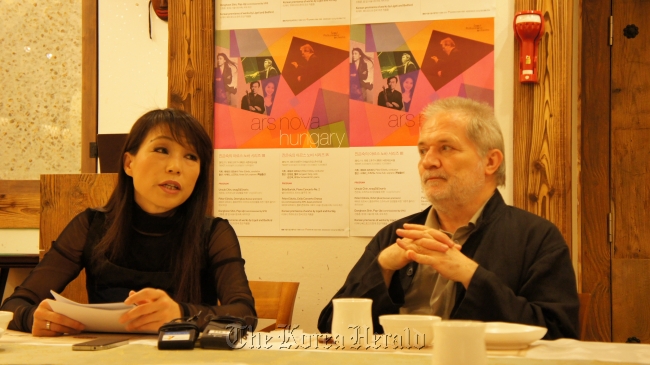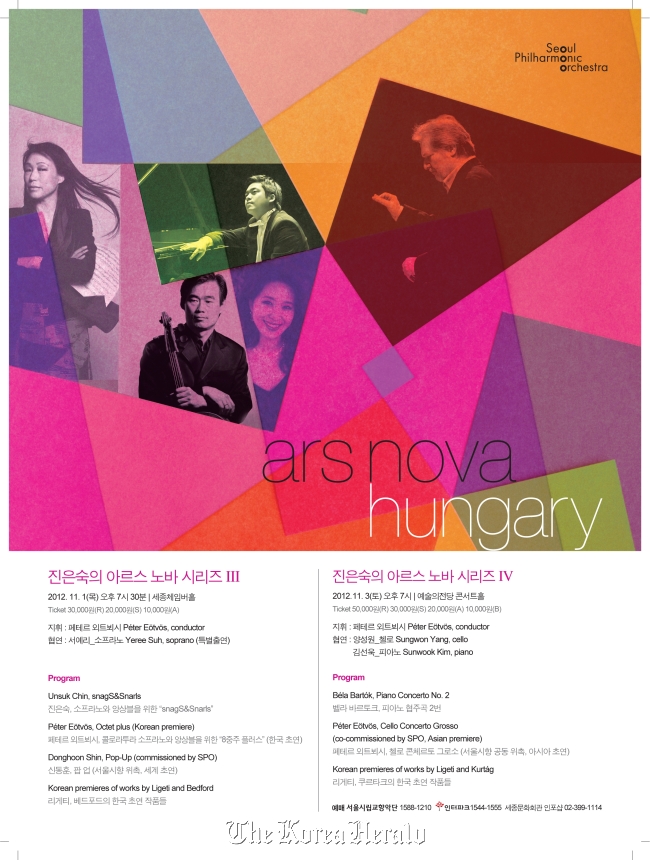The Seoul Philharmonic Orchestra’s annual “Ars Nova” concerts are a welcome treat for fans of contemporary classical music in Korea which suffers from a dearth of contemporary classical music performances.
Marking the seventh year of “Ars Nova,” SPO is exploring an unfamiliar yet intriguing world of “balance amid imbalance” under the theme of “Ars Nova Ⅲ&Ⅳ―Hungary.” There will be two concerts, each with a different program, for this year’s edition ― the first at 7:30 p.m., Nov. 1 at the Chamber Hall of the Sejong Center for the Performing Arts in downtown Seoul and the second at 7 p.m., Nov. 3 at the Seoul Art Center Concert Hall in southern Seoul.
Carefully handpicked by composer-in-residence Chin Un-suk, the concerts feature pieces by Hungarian composers including Peter Etvs, who is visiting Korea as a composer and conductor of the event.
Etvs, considered one of the most noted musicians of our time, will conduct “Cello Concerto Grosso” in its Asian premiere. Jointly commissioned by the SPO, Berliner Philharmoniker, Tonhalle Zrich, Bergen Filharmoniske Orkester and Toronto Symphony Orchestra, it had its world premiere last year. His other piece, “Octet plus for coloratura soprano and ensemble 19” is also making a Korean premiere.
“Cello Concerto Grosso is a full-flavored conversation between the soloist and a group of eight cellos. It is a mixture of different voices and tones ― from strong and raging, to a wide and relaxing tempo, the contrasting images swirl rapidly, giving both a modern and Hungarian touch to the atmosphere,” Chin said.
Etvs will also conduct fellow Hungarian Gyrgy Ligeti’s “Mysteries of the macabre for coloratura soprano and ensemble” and “Concert Romnesc”; Gyrgy Kurtag’s “New Messages for Orchestra,” and Bel Bartk’s Piano Concerto No.2 in G Major, SZ95. All of the pieces are being performed for the first time in Korea.
Soprano Suh Ye-ree, acclaimed for her clear diction, will be singing the melody while cellist Yang Sung-won, a professor at Yonsei University, will lead Etvs’ cello piece.
 |
Seoul Philharmonic Orchestra composer-in-residence Chin Un-suk (left) and Hungarian composer and conductor Peter Etvs speak at a press briefing ahead of the “Ars Nova III&IV―Hungary” in Seoul, Monday. (Seoul Philharmonic Orchestra) |
 |
Poster for the “Ars Nova III&IV―Hungary” Courtesy of Seoul Philharmonic Orchestra (Seoul Philharmonic Orchestra) |
“Yang flew over to the Berlin Philharmonic’s world premiere of the piece, learnt the piece by heart and invested many days in refining his play. He has also held many discussions with other players to deliver the song in the most accurate yet emotional way,” Chin said.
Bartk’s challenging piano piece will be played by Kim Sun-wook, who debuted on the world stage at the age of 18 by winning the Leeds International Piano competition in 2006. The piece is so complex that Kim joked that he should not have taken the offer.
“The muscles of the hands undergo spasms while beads of perspiration drop on the keys. Those who have played the piece couldn’t give any advice but wish good luck to the next performer,” Chin said.
For Etvs, who is in Korea for the first time, having a concert themed on his country is special.
“The orchestral program based on Hungarian music gives me a sense of personal contact. I was a little boy when Ligeti and Bartk were active. But studying them gave me a great sense of comfort,” he said. Alongside the Hungarian powerhouses, rising British composer Luke Bedford’s “By the Screen in the Sun at the Hill on the Gold” will be performed for its Asian premiere.
“Among his pieces, I say this one is the best,” explained Chin. “POP UP,” a piece by 29-year-old Shin Dong-hoon, who is Chin’s protg, commissioned by the SPO, will also be performed for the first time.
Etvs will also rehearse pieces by up-and-coming composers Texu Kim and Choi Jae-hyuk on Oct. 31 at the SPO studio.
“Choi is only 18 years old but has shown remarkable maturity in his pieces and is definitely one to watch for,” Chin said.
For Chin, regarded as one of the most influential contemporary classical composers today, the Ars Nova event is a rare opportunity for her to meet audiences in Korea, where the music of Beethoven, Mozart and other centuries-old names dominate music halls.
“The SPO has been the only orchestra to perform modern music on a regular basis. I hope more people will feel closer to the ‘classics of the future,’” she said.
By Bae Ji-sook (
baejisook@heraldcorp.com)









![[Weekender] Korea's traditional sauce culture gains global recognition](http://res.heraldm.com/phpwas/restmb_idxmake.php?idx=644&simg=/content/image/2024/11/21/20241121050153_0.jpg)